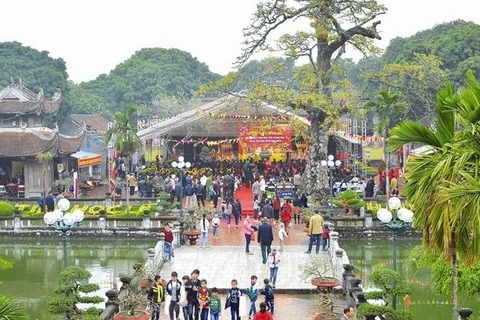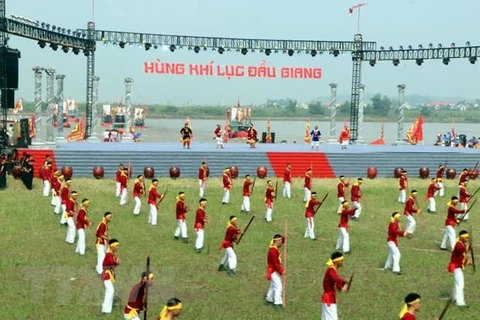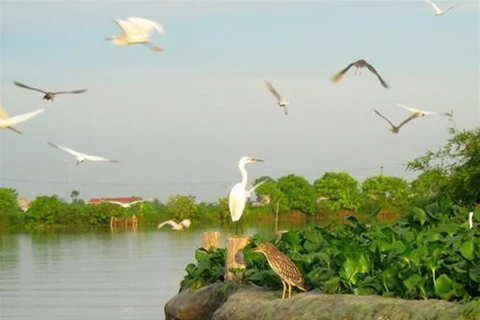 Boats on the Luc Dau River reenact the three victories of the Tran Dynasty over the Yuan-Mongol invaders over 700 years ago, an activity of the Con Son – Kiep Bac Autumn Festival (Photo: VNA)
Boats on the Luc Dau River reenact the three victories of the Tran Dynasty over the Yuan-Mongol invaders over 700 years ago, an activity of the Con Son – Kiep Bac Autumn Festival (Photo: VNA) Hai Duong (VNA) – The special national relic site Con Son – Kiep Bac in Chi Linh city, the northern province of Hai Duong, welcomed about 120,000 visitors from September 13 to 18 during its autumn festival, up about 40 percent year on year.
On the three peak days of the event from September 14 to 16, it attracted around 75,000 people, according to the relic site’s management board.
The annual Con Son – Kiep Bac Autumn Festival takes place in the eighth lunar month, which is in the middle of autumn according to folk beliefs.
This year, it marked the 719th death anniversary of national hero Hung Dao Dai Vuong Tran Quoc Tuan (1228 – 1300), known as Tran Hung Dao for short, and honoured the Tran Dynasty (1225 – 1400). The event also celebrated the 577th death anniversary of the world’s Great Man of Culture Nguyen Trai (1380 – 1442).
The festival featured a range of traditional rituals and cultural activities. Notably, a performance with the participation of 1,500 people and around 500 boats on the Luc Dau River reenacted the three victories of the Tran Dynasty over the Yuan-Mongol invaders over 700 years ago.
Activities during the festival also aimed to popularize the values of the Con Son – Kiep Bac special national relic site, helping to raise public awareness of the practice, preservation and promotion of national cultural heritage.
Most visitors to this year’s event were satisfied with landscape improvements at the site, which had many of its facilities upgraded and services bettered.
They also received support from local youth volunteers who helped with keeping the environment clean and giving instructions to visitors.
Additionally, in response to the anti-plastic waste campaign, organisers placed a number of large water containers in multiple places across the site to serve visitors for free instead of distributing small bottles. Flower lanterns floated at the event were made of paper.
Under the Tran Dynasty, commander Tran Hung Dao led the military of Dai Viet (Great Viet – the name of Vietnam then) to victories over two of the three Yuan-Mongol invasions, in 1285 and 1288.
Kiep Bac Temple is the most renowned place of worship of Tran Hung Dao. The local area was also his birthplace and the place where he set his military base during the fights against the foreign invaders.
Meanwhile, Nguyen Trai was a great contributor to the establishment of the Hau Le (Latter Le) Dynasty (1428 – 1789) following the triumph over the Ming invaders. He was also a most famous poets and writers in the country’s history.
Con Son Mountain was where Nguyen Trai spent part of his time in seclusion.
Con Son – Kiep Bac was recognised as a national relic site in 1962 and a special national relic site in 2012.
Aside from the autumn festival, it is also the venue of an annual spring festival. Both events were listed as national intangible cultural heritage in 2013 by the Ministry of Culture, Sports and Tourism.
Hai Duong province was associated with the lives of not only Tran Hung Dao or Nguyen Trai but also many other renowned figures in Vietnam’s history such as Khuc Thua Du, Chu Van An and Mac Dinh Chi.
It is home to more than 2,200 historical and cultural relic sites, including 144 national relic sites and four special national ones.
Additionally, Hai Duong boasts a number of scenic landscapes like Con Son Mountain, Phuong Hoang Mountain, An Phu Mountain, Duong Nham Mountain, Kinh Chu Cave and the Luc Dau River.
Craft villages have also make the province known far and wide, including Dong Giao wood engraving village, Chu Dau pottery village, Chau Khe jewelry making village, Xuan Neo embroidery village, and Tien Kieu mat weaving village./.
VNA
























